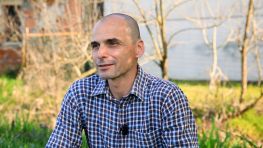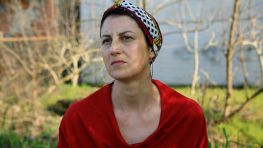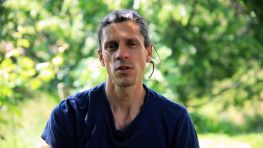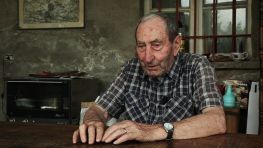 Roberto Marinone
Roberto Marinone Stefania Goio
From conventional to organic: an overwhelming generational shift.
Stefania Goio took over the reins of her father's company with all the energy and impetuosity that characterize her. When she proposes to her father, a lifelong conventional farmer, to convert the whole company to organic, using the method of the "pioneers" of Rovasenda, the Stocchi family, she throws the entire mail on the plate: the whole company or nothing. ! The father, although hesitant about the possibility of relying on a new cultivation method, the results of which seemed more uncertain than ever, finally decides to put in his daughter's hands what he had built in a lifetime.
The first two years are difficult and the results are struggling to arrive but with courage and perseverance the family does not give up and continues to believe in the project. Today Stefania's gaze is that of who she knows she was right and who is proud of her choice. Stefania's ultimate goal is to create a closed-cycle company, both environmentally and economically sustainable, which includes production, processing and direct sales. A company store in Rovasenda and a temporary store in Paris are the first important pieces of this long and difficult process.
Video table of contents
- I inherited the farm from my father and immediately switched to organic farming with the green mulch method.
- Convince my father to go organic with all 40 hectares of the company.
- The first year of sowing in weed: the conversion starting from exhausted soils.
- Being able to count on the experience of others has benefited us a lot and has made us understand that rice on rice is impossible in organic farming.
- Old techniques like rotation that come back.
- Life in our fields and tree planting for biodiversity and protect us from conventional.
- Nature does it by itself with the weed method and the results with weeds are excellent.
- Cultivation with chemistry: drinking milk to purify yourself of herbicides.
- Collaboration between organic farms in Rovasenda, exchanges of equipment, biodistrict, conferences, meetings.
- Open to dialogue and happy to collect testimonies on traditional pre-chemical cultivation techniques.
- For everyone it is possible to do organic farming: the water workers know how to manage the water so that everyone can have clean water.
- The happiest moment for me: my father's consent to undertake organic rice cultivation!
- Discover new things every year: the terrain and climate change and it's nice to experiment!
- With organic farming you go back to observing nature and taking what it offers you spontaneously, without forcing with chemistry.
- In twenty years I would like to have a circular company: production, processing, sales and giving continuity to my father's project.
- I want my company to be a place open to the local community but above all to other members of my family.
- Share the organic cultivation project because I'm proud of it! It is the enthusiasm of the customers that gives me strength.
- The temporary store in Paris and the surprise of the Parisians of having in front of the farmer and not a mediator.
- After sowing, fermentation, a difficult time.
- The safeguard of the frogs, the counter ditches near the embankments.
- The role of the water seller: mediator between farmers.
- Sant'Andrea: the family variety.
- We produce the rice for sowing.
- Future generations and the hope that they will take over the company.
- The first difficult years followed by weed-free rice paddies without using an ounce of chemistry.
Interview information
Country: IT
Region: Piemonte
City: Rovasenda
Stefania Goio
Year: 24
Profession: Farmer
Languages: Italiano
Document by: Luca Ghiardo
Video by: Luca Ghiardo
Created: 03-06-2021
Questo video fa parte del seguente archivio
Rice stories
Rice stories
Food is a fundamental resource for man and his health, both through the supply of nutrients and the ability to embody traits of human culture that play a leading role in our well-being.
Over time, each territory has built original ways in which to relate to the fruits of its land, enriching them with rituals, symbolic meanings and culinary customs. Much of these relationships have been lost following the years of the economic boom, with the exodus from the countryside to urban centers, with the advent of agriculture for mass production and ultimately with the globalization of markets and the consequent impoverishment of the heritage of biodiversity and ethnodiversity.
The purpose of this archive is to collect evidence relating to the main rice production area in Europe, that is the Po Valley, and to investigate, through the analysis of textual sources and testimonies collected in the field, both what survives of this heritage, and the ways in which which has evolved and reached us, paying particular attention to the explicit and implicit links that bind food and health.






